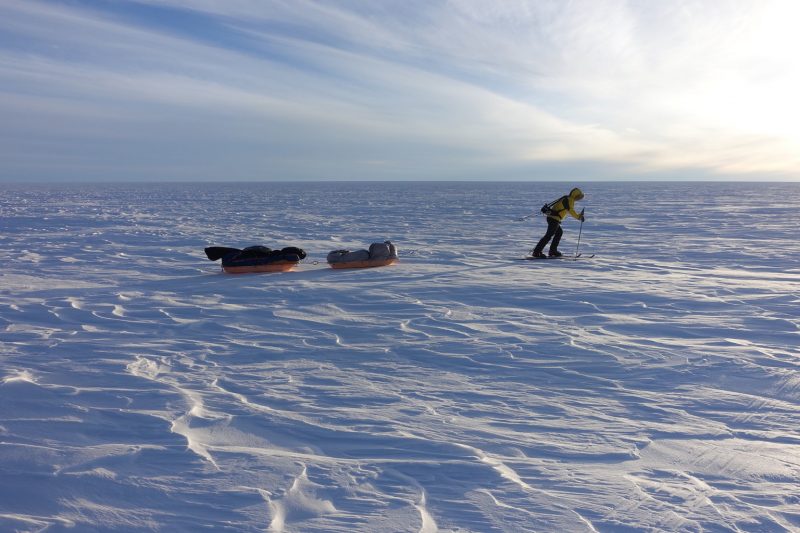American adventurer Colin O'Brady just made it across Antarctica alive, alone, and way ahead of schedule.
That feat makes O'Brady the first person to ever cross the southern continent on a solo, unsupported mission without getting resupplied or using a kite.
"This is something that no one in history has ever accomplished, and people have been trying for 100 years," O'Brady told Business Insider before he started the record-breaking trek.
According to his live-tracking map, O'Brady reached his finish line on the Ross Ice Shelf on December 26. He quickly followed up with photo proof, confirming he'd skied 932 miles across the frozen desert, towing a sled full of gear.
Every other person who's tried that before has either given up or died. A British explorer, Louis Rudd, is also racing to accomplish the same lofty goal, but Rudd was still 73 miles from the finish line when O'Brady arrived on the edge of the shelf at the Leverett Glacier.
O'Brady has posted photos of his daily grind on Instagram throughout the journey. After his momentous finish, here are some highlights from his adventure at the bottom of the world.
The Antarctic crossing is not O'Brady first world record. In 2016, he trekked to the top of the highest peaks on all seven continents, including Everest and the highest point in Antarctica, in just 132 days. That earned him a world record for the fastest climb of the seven summits.
On this journey, O'Brady wasn't going for speed.
"When you have a 400-pound sled, there's no running. It's very slow going," he said. He trained for harsh Antarctic conditions in Greenland, where he completed a 30-day, 400-mile practice run.
Still, there was no way to prepare for the complete solitude he'd endure during his 54 days in Antarctica.
O'Brady moved with impressive speed. His original plan was to finish the journey in January, taking about 70 days for the trek. But he completed it weeks ahead of schedule.
When he began his trek, O'Brady's sled weighed 400 pounds. Of that, 220 pounds were food — enough to last him for more than two months. He also hauled a tent, a sleeping bag, cameras, a satellite phone, and 30 pounds of fuel for cooking.
With average temperatures in Antarctica dipping below minus 18 degrees Fahrenheit, water instantly turns to ice. O'Brady showed his followers what that looks like four days in to the trek.
Whiteouts were a frequent bother. O'Brady said being in Antarctica can feel like standing inside a ping pong ball. Sometimes wind and visibility were so bad that O'Brady had to stop hiking and set up camp during storms.
O'Brady subsisted on a diet of oatmeal, soup, freeze-dried meals, and special 1,250-calorie "Colin Bars" that his sponsor, Standard Process Supplements, made for him. They're a blend of coconut oil, nuts, seeds, veggie protein, and cocoa powder. O'Brady downed about four bars per day. "Unfortunately, fresh food is a little bit too heavy," he said.
This journey was the longest amount of time the adventurer ever spent without human contact. He drew this heart for his wife, Jenna Besaw, in the snow. She helped him prepare for the journey and was always a satellite phone call away on the trek.
O'Brady revealed some unsavory truths about the journey along the way. For one, he brought only a single pair of underwear along. Using the bathroom was also a strange chore, since Antarctic explorers carry out every piece of waste they create. That includes what comes out their rear ends.
Fortunately, with average temperatures well below freezing in Antarctica, his feces probably didn't have much of a smell.
O'Brady's pace quickened after he reached the South Pole on December 12. It took him roughly 40 days to reach that point.
Ten days ago, O'Brady mentioned in an Instagram post that he had "just enough" food to "hopefully" get him to the end.
He battled fierce Antarctic storms, but he recently said he'd tapped into a "flow." That allowed O'Brady to travel over 33 miles in 13 hours.
O'Brady said his record would never have been possible without a healthy mind and body. He bulked up with about 20 extra pounds of muscle before heading to Antarctica.
Less than 80 miles from the finish, O'Brady embarked on a final ultramarathon: one 32.5-hour sleepless last slog to end his record-breaking quest. "I called home and talked to my mom, sister and wife — I promised them I will stop when I need to," he said.
After 54 days of trekking, O'Brady arrived at the Leverett Glacier on December 26, with 932 miles behind him. "The wooden post in the background of this picture marks the edge of the Ross Ice Shelf, where Antarctica’s land mass ends and the sea ice begins," a beaming but exhausted O'Brady said, his eyes filled with tears as he phoned his wife.
"I am not unique in this ability" O'Brady recently said on Instagram. "We all have reservoirs of untapped potential and our bodies and spirits are capable of so much more than lies on the surface."
Source: businessinsider.com












